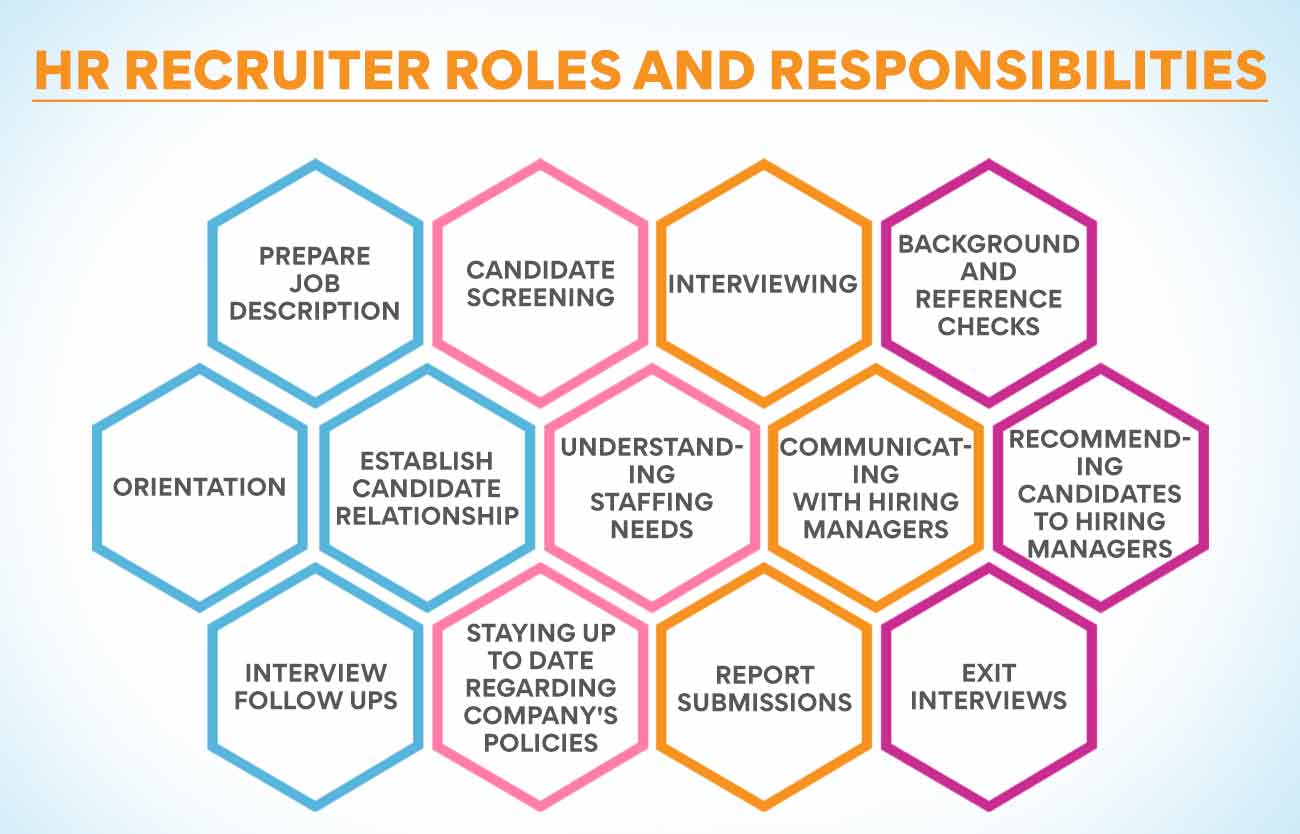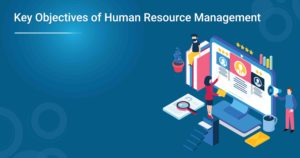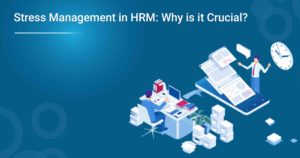HR Recruiter Roles and Responsibilities: Human resources (HR) recruiters play a vital role in any company, as they are responsible for attracting, screening, and hiring the best candidates for open positions. While the job may seem straightforward, a lot goes into being a successful HR recruiter. This blog post will explore HR recruiter roles and responsibilities so that you can better understand what the job entails. From conducting interviews to writing job descriptions, read on to discover what you need to be a successful HR recruiter.
Who Is An HR Recruiter?
An HR recruiter is responsible for identifying, screening, and interviewing candidates for open positions. They may also be responsible for conducting reference checks, maintaining records of applicants, and communicating with hiring managers. In some cases, HR recruiters may also be responsible for onboarding new candidates and orienting them to the company culture and values.
HR Recruiter Roles And Responsibilities
Prepare Job Description
As an HR recruiter, your responsibility is to identify, assess, and hire the best talent for your company. To get this done efficiently, you must first develop a clear understanding of the role you are recruiting for. This means creating a detailed job description that outlines the essential duties, skills, and qualifications required for the position.
Once you have a better understanding of the role you are recruiting for, you can begin to identify potential candidates. You must utilise various recruitment methods to find the best candidates, including online job postings, employee referrals, and networking events.
Once you have identified a pool of qualified candidates, it is time to start the interview process. During this phase, it is essential to assess each candidate’s skills and qualifications against the role’s requirements. The goal is to select the candidate who is the best fit for the position and who can contribute with their skills and expertise to the success of your company.
Candidate Screening
As an HR recruiter, you are responsible for screening candidates for open positions within the company. This includes reviewing resumes and conducting initial interviews with candidates.
It is essential that you can identify the key qualifications and skills that each position requires. You should also be able to assess each candidate’s fit for the role based on their qualifications and interview performance.
You will need to maintain a high level of communication with hiring managers to keep them updated on the status of candidate screening. It is also essential that you provide feedback to candidates promptly.
Interviewing
HR recruiters play a vital role in hiring by screening and interviewing candidates for open positions. They are responsible for identifying qualified candidates, conducting initial interviews, and making recommendations to the hiring manager.
The HR recruiter role is essential because they are the candidates’ first point of contact. They set the theme for the rest of the interview process and can make or break a candidate’s impression of the company.
To be successful in this role, HR recruiters must be able to quickly assess a candidate’s qualifications and match them with the open position. They must also be able to sell the company to candidates and build rapport effectively.
The most successful HR recruiters are those who are adaptable, organised and have excellent people skills. If you possess these qualities, a career as an HR recruiter may be right for you!
Also Read: Key Objectives of Human Resource Management
Background And Reference Checks
As an HR recruiter, you are responsible for screening candidates and performing background and reference checks. This ensures that only the most qualified candidates are hired for the company.
To screen candidates, you will need to review resumes and applications. You will also need to conduct interviews. During the interview, you will ask questions about the candidate’s experience and qualifications. You will also use this time to become acquainted with the candidate on a personal level.
After you have screened the candidates, you will need to perform background and reference checks. This involves contacting the candidate’s previous employers and references. You will also need to run a criminal background check. This ensures that the company is hiring only the most qualified individuals.
Orientation
The HR recruiter roles and responsibilities are for attracting, screening, and selecting qualified candidates for open positions within an organisation. They may also be responsible for conducting interviews, reference checks, and managing the offer process. In addition, HR recruiters may also be responsible for developing and maintaining relationships with key stakeholders, such as hiring managers, college career centres, and professional organisations.
The most successful HR recruiters can identify the most qualified candidates for open positions through their ability to screen resumes and conduct meaningful interviews. They are also excellent communicators and can develop strong relationships with candidates and hiring managers. In addition, they have a strong understanding of employment law and are familiar with the various compensation and benefits package options.
Establish Candidate Relationship
The HR recruiter is responsible for establishing relationships with candidates and providing them with information about the company and job openings. The recruiter also screens candidates and provides recommendations to hiring managers.
The HR recruiter role is crucial because it allows the company to find the best candidates for open positions. It is also essential to build relationships with potential candidates so they will consider applying for future openings.
The most important responsibility of an HR recruiter is to establish relationships with candidates. This can be done by:
- Providing accurate and up-to-date information about the company and job openings
- Answering questions candidly and honestly
- Returning phone calls and emails promptly
- Keeping in touch even when there are no open positions
Understanding Staffing Needs
To understand your staffing needs, it’s essential to know the daily responsibilities of an HR recruiter. Here’s a guide to help you:
An HR recruiter is responsible for many things. Their primary responsibility is to attract, screen, and select qualified candidates for employment. However, they also have a crucial role in employee retention and development. Additionally, HR recruiters are often responsible for creating and maintaining employee records.
The first step in understanding your staffing needs is determining your company’s specific needs. Once you’ve done that, you can start looking for an HR recruiter who can help you meet those needs.
Communicating With Hiring Managers
As an HR recruiter, one of your key roles and responsibilities of HR recruiter is communicating with hiring managers. This involves keeping them updated on recruitment efforts’ status, providing candidates feedback, and answering any questions they may have.
Excellent communication skills are integral for this role, as you will become the central point of contact between the hiring manager and the rest of the HR team. You must build strong relationships with hiring managers and gain their trust.
Excellent time management skills are a must! To ace this role, you must be organised and have excellent attention to detail. You will need to keep track of multiple moving parts at any given time and make sure that everyone is following the same goals and on the same page.
Recommending Candidates To Hiring Managers
As an HR recruiter, one of your daily responsibilities is recommending candidates to hiring managers. This involves working closely with managers to identify their needs and then sourcing and screening candidates who are right for the position.
To recommend candidates to hire managers, you will need to:
- Work closely with managers to understand their needs
- Source and screen candidates who are the best fit for the position
- Make recommendations to managers based on your findings
If you follow these steps, you will be able to effectively recommend candidates to hire managers and help them fill positions in their departments.
Interview Follow Ups
As an HR recruiter, one of your daily responsibilities is to follow up with candidates after interviews. This involves sending a thank-you note and keeping in touch with the candidate to ensure they are still interested in the position.
Thank-you notes are a vital part of the interview process and can show candidates that you value their time and effort. Keep your notes short and sweet, and be sure to personalise them for each candidate.
When following up with candidates, staying in touch without being too pushy is essential. Send periodic updates about the position and company, and be available to answer any questions. Ultimately, you want to ensure the candidate feels comfortable and informed throughout the process.
Staying Up To Date Regarding Company’s Policies
Assuming the HR Recruiter roles and responsibilities. One of the most critical prospects of the job is staying up to date on company policies. After all, it is the HR Recruiter’s job to ensure that potential new hires are made aware of all company policies during the interview process.
This means that the HR Recruiter must have a thorough understanding of all company policies and be able to communicate them to candidates effectively. It is also imperative to answer any questions that candidates may have about company policies.
Staying up to date on company policy changes and updates is critical for HR recruiters. They must be able to quickly adapt their recruitment strategies and tactics to stay compliant with new regulations. Additionally, they should be proactive in communicating these changes to candidates so that there are no surprises down the road.
Report Submissions
The HR’s daily responsibility for report submissions is to ensure that all reports are accurate and up to date. This includes reports on employee performance, company policy compliance, and other relevant information. The HR recruiter roles and responsibilities include ensuring that reports are submitted promptly.
Also Read: Breaking Down The Scope Of Human Resource Management
Exit Interviews
The HR department is responsible for conducting exit interviews with departing employees. This process helps to identify any areas where the company may be losing good employees and can provide valuable feedback for improving the workplace.
Exit interviews should be conducted professionally and respectfully. The interviewer should ask questions about the departing employee’s experience with the company, their reasons for leaving, and their suggestions for improvement. All of this information should be documented and shared with the appropriate members of management.
Conducting exit interviews is an essential part of the HR department’s role in ensuring a positive work environment. By taking the time to listen to departing employees’ feedback, the company can make necessary changes to improve morale and reduce turnover.
How To Become An HR Recruiter?
You can take a few key steps to become an HR recruiter. First, it is essential that you have a better comprehension of the HR field and what recruiting entails. You should also be well-versed in the latest recruiting technologies and strategies. Additionally, having strong interpersonal skills will be critical for success in this role.
Here are some critical steps you should take to become an HR recruiter:
- Pursue a degree or certification in human resources or a related field. This will give you the foundation required to understand the complexities of the HR field and learn best practices for recruiting.
- Gain experience in the recruitment process through internships or other opportunities. This hands-on experience will be invaluable as you pursue a career in this field.
- Stay up to date on all the latest technologies and trends in recruitment. This includes using social media platforms for sourcing candidates and utilising applicant tracking systems (ATS).
- Develop your interpersonal skills so that you can build relationships with candidates and effectively sell them on your company’s opportunity during the interview process.
Conclusion
A recruiter’s role is vital to the success of any business. They are responsible for finding, screening, and hiring the ideal candidates for open positions. A good recruiter will have a deep understanding of the company’s culture and values and be able to find candidates that fit those ideals. Whether you are planning for a career in HR recruiting or fine-tuning your skills, this guide should give you a better idea of what to expect regarding HR Recruiter roles and responsibilities.
To complement your knowledge about the roles and responsibilities, check out our Post Graduate Certificate in Human Resource Management.
More Information:
Role Of Human Resource Management in an Organization
Objectives & Nature of Human Resource Management




























